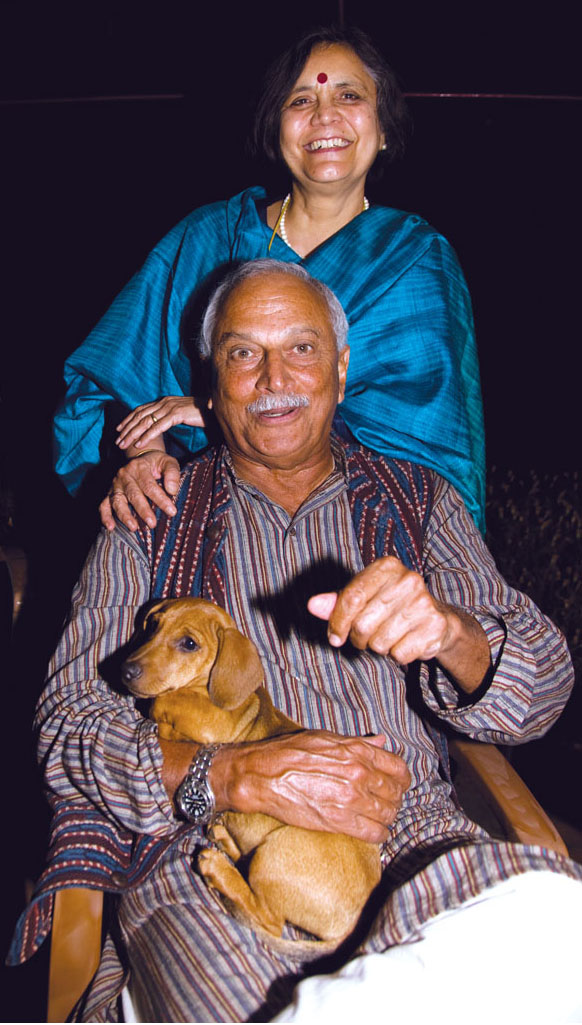
An invitation from Air Marshall K C Cariappa to join him and his wife Meena for dinner at his home was the highlight of my trip to Coorg.
There is something about the Air Force men that arouse feelings of awe, and this strapping man was even more special. Not only because he was the son of Field Marshall K M Cariappa, but a hero who was once captured as a prisoner of war (Indo-Pak, Sept ’65) My colleagues and I left Mahindra Resort, where we were staying, in good time to be able to reach Roshanara, the ancestral home of the Cariappas in Madikeri. The appointed hour was “10 minutes past eight”.
Driving in the daytime in the Madekeri hills is tricky enough with endless stretches of narrow tree-lined roads, so you can imagine how it was at night. The dark seemed darker and we got quite lost on the hilly roads. Trying to find someone on the lonely path, to ask for directions, was a task in vain. , , , .
We were feeling pretty rotten because you just don’t keep people like the Cariappas waiting. Punctuality is the norm with them.
When we did reach our destination, gracious as he is, the Air Marshall was more concerned about our predicament rather than the fact that we messed up with his idea of “an early dinner”. Brushing aside our apologies, he immediately put us at ease by introducing himself simply as Nanda and insisting we address him so. “Let´s get the drinks out of the way,” he said, “who is drinking, what?” he enquired, rubbing his hands.
The drinks order taken and quickly executed, he returned with a tray in hand and was leading us out the back door and into the back yard where chairs and tables were set, along with a two-seater metal swing under a fabric canopy, painted by his grandchildren.
“So! What brings you to Coorg, my Coorg?” he asked, eyes twinkling. I told him about the magazine and the popular UpperCrust Destination section that our readers look forward to, where we now planned to feature Coorg. But I didn’t tell him just then that I was hoping to include them too and that in my handbag I had a ´verrry´ serious camera.
Instead, I asked him when did he retire and how does it feel. “Oh, it’s been marvellous,” he said. “I retired on Jan 31, 1996 and drove down straight from Jodhpur, where I had given up charge. I reached Coorg on Feb 6 and have been here ever since. I hate leaving Coorg and do so only when I really have to. It’s strange, but just before you retire, you dread it, and now it’s been 15 years and I don’t know where they have gone!”
By and by as one conversation led to another, each of us felt more and more comfortable with the warmth that Meena and Nanda exuded. The night was chilly and we were sitting out in the open, under the stars which were shinning brilliantly in the clear skies. Pointing towards the sloping land and in the direction of the dark shadows, Nanda nonchalantly informed us that there could be wild animals right there. Brrr…
Roshanara is a house with character. Not a showcase kind of a house, but one which tells a tale. Where each artifact has a story to tell, a reason to be there.

I don’t normally ask for a tour of a house I am visiting, that too for the first time, but this one I was curious about.
“Chalo,” said Nanda Cariappa, when I asked if I could prowl around. And actually accompanied me. The anteroom was so rustic. Sports jackets and long coats, mufflers hanging on hooks, walking shoes and boots in another corner, hats, one with a feather stuck to it an a stand… not the kind of things we city people often see in homes. The large living room with a fire place “that works brilliantly and has never ever given us any problems” led to another sunken sitting room, painted a soft blue. The chandeliers, with delicate glass work were obviously antique, but then the house itself qualifies as heritage being 160-years old. “It’s been in our family since 1944. We have some nice drawings and water colours done by the different residents, it is a remarkable house. When Father bought it, it came with some 50-odd acres, but now after bequeathing some to my sister and other people, also the municipality, it´s down to 33, but it´s much more than enough,” said Nanda.
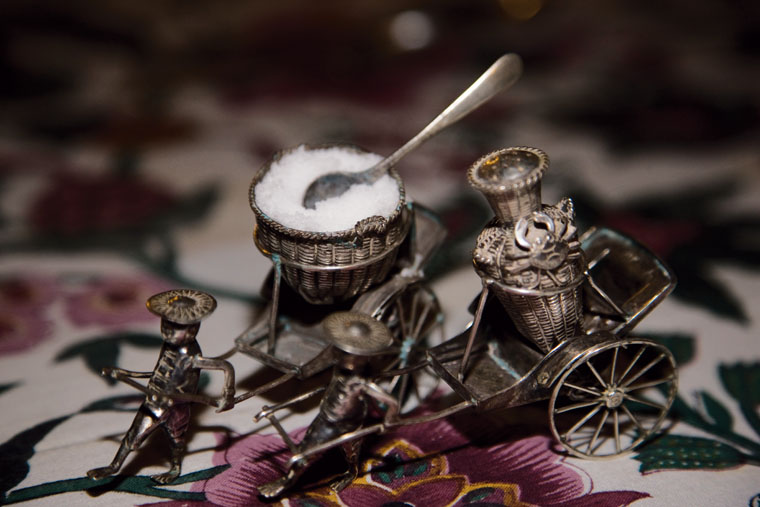
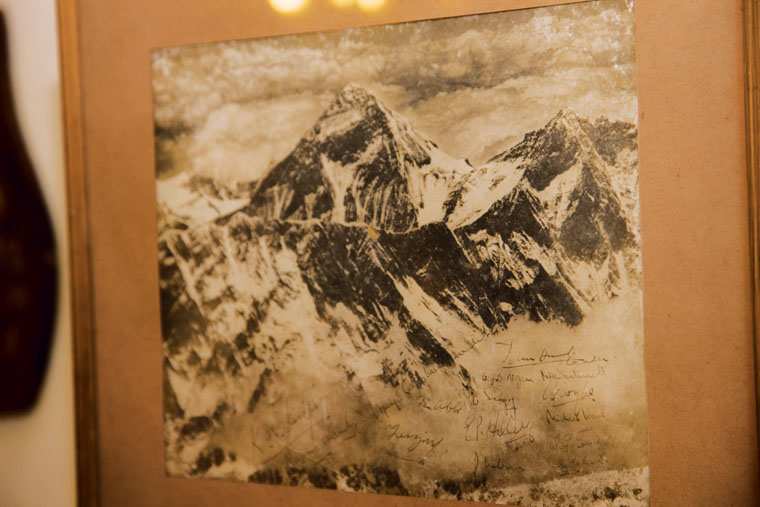
When I asked to be shown Field Marshall Cariappa’s favourite room I saw it was a modest room, opening to the garden and had many picture frames in it.
Again, each with a story. But one was extra special. An original black and white photograph of the Himalayan range with Mount Everest Massif with signatures of members of the first expedition, including those of Edward Hillary, Tenzing Norway and Capt John Hunt. It was then and with some trepidation that I checked if I could click some photographs. Nanda Cariappa looked at me, paused for just a moment and then said a quiet, ‘yes’ and I got to work as inconspicuously as possible. I respect people like Nanda who though fiercely private will not make a fuss about it. It was in that instant that I was reminded of another photo shoot, the very first cover story of this magazine, in 1999.
Co-incidentally it was with Air Marshall Idris Latif and Begum Bilkis Latif in their house in Hyderabad. Publicity shy as they were too, they could not refuse a request from Behram and I. Latif´s only plea was could we eat without interruption the Hyderabadi food which his wife had lovingly cooked. And could I shoot pictures of them and their guests, after we had eaten lunch?
Keeping that memory in mind, I put my camera away after taking just two pictures at the dining table. Some things we have to save in the memory chip of our mind’s eye.
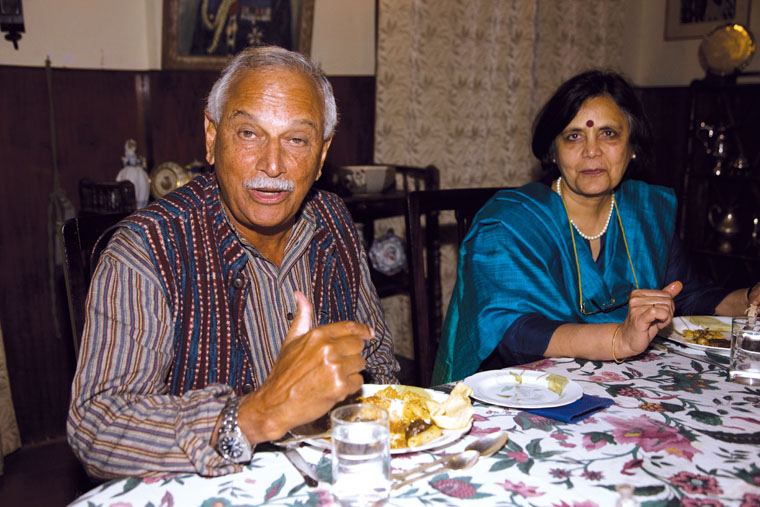
Dinner was typical Coorg fare. Meena is a good cook. Used to entertaining, she had set a good table and at such short notice. But she was apologetic. And invited us to come again when she would do better. Naw…
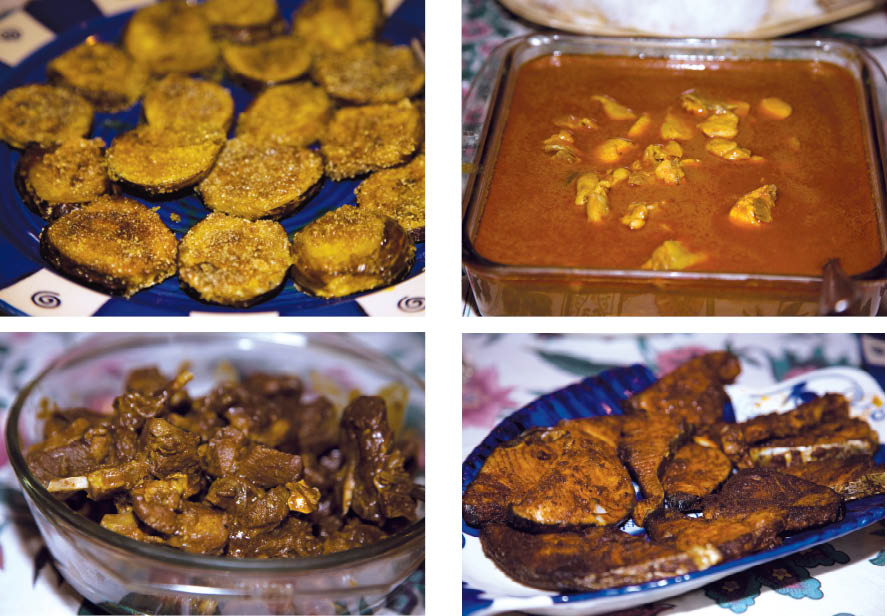
After dinner, with GJ (Gulab Jamun) nestling in the Air Marshall´s arms and Tojo at his feet, we again sat talking and discussing everything under the sun (moon, actually), like old friends. Life in Coorg, life after retirement, food, wine, music, travel, religions of the world.
Both Meena and Nanda love the quiet life in Coorg. They are happy to spend time by themselves and few close friends. Nanda enjoys his golf, and sometimes goes angling. He used to ride, but has now got himself a mountain bike, which he loves to ride. He likes wearing the traditional Coorg kupiya when he goes for weddings.
At home, at night they both love to listen to Indian Classical Music. Nanda writes a fair amount for journals on subjects like Wild Life, Environment and International Relations. He had in fact spent four months in the U.S. in 2001 writing a paper on ‘Confidence Building Measures’, between India and Pakistan, a collaborative exercise with a fellow Air Marshall from Pakistan. The paper, due to the many unfortunate events (read terror activities) that took place around and since that time, got shelved. A pity.
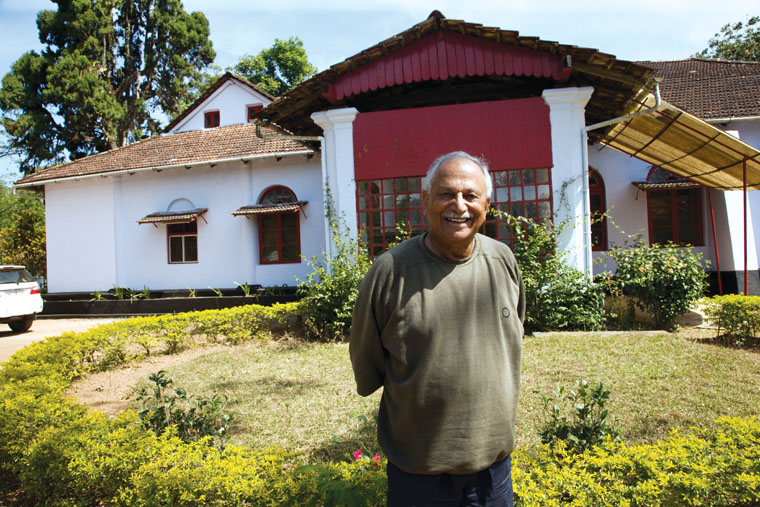
For the present, Nanda Cariappa finds solace in trekking. Which he says he discovered only after retiring. Every year he goes into the Himalayas for two weeks of intensive walking and climbing. The next one in August is already planned right down to the last detail.
Lastly, I learned that Nanda is pretty fascinated by two other religions, Islam and Sikhism. He reads the Quran in the ´Roman English´ version and its translation in English, going to the local mosque for clarifications from the maulvi, if he does not understand something.
He even recommended a book he was currently reading; Foundation of Islam, The Making of a World Faith by Benjamin Walker. He is so influenced by Islam, his speech is peppered by Insha’allah and Masha’allah.
Come to think of it, when we were leaving, he had said, Khuda Hafiz.
Well, Khuda Hafiz dear Nanda, phir milenge, Insha’allah.
source: http://www.uppercrustindia.com / Upper Crust / Home> True Blood Kodava / July-Sept 2015
 Air Marshal Cariappa, son of Field Marshal K M Cariappa, topped a poll conducted by www.coorgtourisminfo.com, the first news portal of Kodagu, to select the Coorg Person of the Year. The others who were in the reckoning for the title, include another hardcore environmentalist and President of the Coorg Wildlife Society, Col C P Muthanna (retd) and New York-based novelist Sarita Mandanna, who has been given the largest advance by Penguin India ever paid to a debut novelist for her novel ‘Tiger Hills,’ set in Kodagu.
Air Marshal Cariappa, son of Field Marshal K M Cariappa, topped a poll conducted by www.coorgtourisminfo.com, the first news portal of Kodagu, to select the Coorg Person of the Year. The others who were in the reckoning for the title, include another hardcore environmentalist and President of the Coorg Wildlife Society, Col C P Muthanna (retd) and New York-based novelist Sarita Mandanna, who has been given the largest advance by Penguin India ever paid to a debut novelist for her novel ‘Tiger Hills,’ set in Kodagu.

